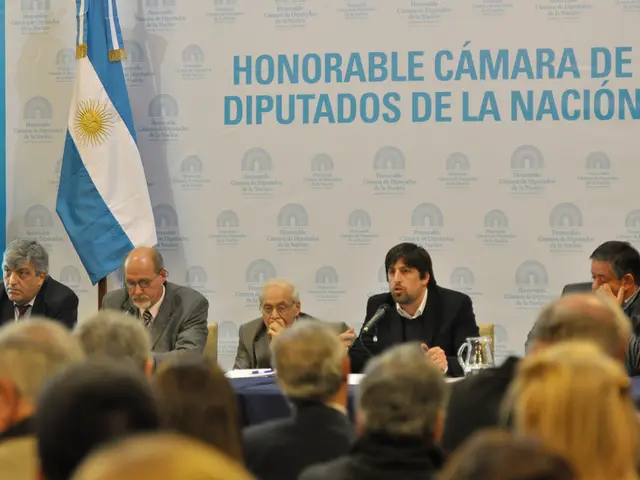Title: Clarence Thomas' Ethical Dilemmas and the Need for Congressional Action
In the realm of public discourse, issues surrounding the Supreme Court have become increasingly prominent. This spotlight has primarily been on Justice Clarence Thomas, his wife Ginni Thomas, and their intertwined involvement in right-wing activism and the judicial system. The growing cloud of ethical concerns surrounding Justice Thomas requires urgent congressional intervention to restore public trust in the Court's impartiality.
Justice Thomas' wife, Ginni Thomas, had transitioned into a prominent, radical right-wing activist. Meanwhile, her husband pushed the Supreme Court to lean further to the right. The justice has repeatedly crossed numerous ethical boundaries in relation to his wife's activities, warranting immediate congressional action.
The tale of the Thomas family and their impact on the Supreme Court took another turn with a groundbreaking New Yorker report. It detailed Justice Thomas' involvement in numerous cases monitored or influenced by his wife's organization. This trend raised eyebrows, with the justice apparently ignoring ethical guidelines often expected of other judges.
Clarence Thomas, like his colleagues on the bench, is expected to uphold judicial ethics and the fiduciary duties inherent in the position. However, he has shown little regard for the self-imposed moral standards presented by the Model Code of Judicial Conduct laid out by the American Bar Association.
Given such apparent ethical lapses, critics argue for Congress to intervene or, at the very least, introduce federal legislation to ensure strict oversight and accountability in the face of mounting suspicions. Despite some attempts by Democrats in Congress to draft bills advocating for transparency in lobbying and ethical behavior in the judiciary, little progress has been made. This lack of action and political will further casts doubt on the Court's ability to uphold ethical standards crucial for public trust.
Congress could kickstart reform by adopting the American Bar Association's ethics code, which has long served as the foundation for judicial conduct. By extending similar regulations to the Supreme Court, justice could be served, and the credibility of the court restored.
Biden's election in 2021 presented a unique opportunity for the resetting of ethical standards in the judiciary, with emerging campaigns advocating for stricter regulations on judicial conduct. These include clearer guidelines for recusal when conflicts of interest arise, expected of any Justice but seemingly overlooked in the Thomas' case.
Public trust in institutions -including, but not limited to, elections and the judiciary- is paramount for a functioning democracy. While congressional interventions might not always receive unanimous support, permitting an erosion of judicial ethics cannot be tolerated. Clarence Thomas must demonstrate adherence to ethical guidelines by retreating from any case involving his wife's interests. In the event of inaction, Congress plays a crucial role in upholding integrity, ensuring justices comply with ethical standards, and restoring public trust in the court system.
Enrichment Insights: - Through clearer regulations and guidelines, Congress could proactively prevent conflicts of interest and restore public trust in the judiciary, particularly as it relates to the ethics of Supreme Court Justices. - Congress could institute the following measures to uphold ethical standards, including adopting strict guidelines for recusal, transparent reporting of financial interests, and an independent oversight committee.
- Binding Ethics Code: a. Adoption of a Binding Code: The Supreme Court should adopt a binding and enforceable ethics code, similar to the Code of Conduct for United States Judges, which includes specific guidelines for recusal and other ethical considerations.
- Transparency in Recusal Decisions: a. Reasons for Recusal: Justices should be required to state reasons for recusal or failure to recuse, ensuring transparency and accountability. b. Formal Procedure for Review: Establish a formal procedure for reviewing recusal decisions to ensure consistency and fairness.
- Disclosure of Financial Interests: a. Spousal Financial Interests: Justices and their spouses should disclose any financial interests that could potentially create conflicts of interest. This includes investments, business affiliations, and any other relevant financial ties.
- Enforcement Mechanism: a. Internal Disciplinary Procedures: Implement internal disciplinary procedures that ensure accountability, such as mechanisms for investigating and addressing ethical violations.
- Public Disclosure: a. Annual Reports: Justices should submit annual reports detailing their financial interests, recusal decisions, and any other relevant ethical considerations. These reports should be publicly available to maintain transparency.
- Independent Oversight: a. Independent Review Board: Establish an independent review board to oversee the enforcement of the ethics code and make recommendations for disciplinary actions if necessary.
- Public Education and Awareness: a. Ethics Education: Provide regular ethics education for Justices and their staff to ensure they understand and comply with the ethical guidelines. Additionally, educate the public about the importance of judicial ethics and the measures in place to maintain them.
- Regulatory Reform: a. Coordination with Stakeholders: Engage with various stakeholders, including attorneys, advocacy groups, bar associations, and regulatory authorities, to ensure that the ethics code is comprehensive and effective in preventing conflicts of interest.
By implementing these measures, the Supreme Court can enhance transparency, prevent potential conflicts of interest, and restore public trust in the institution.







